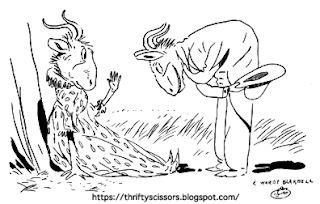by Burges Johnson
There was a lovely lady Gnu
Who browsed beneath a spreading yew
Its stately height was her delight;
A truly cooling shade it threw.
Upon it little tendrils grew
Which gave her gentle joy to chew.
Yet oft she sighed, a-gazing wide,
And wished she knew another Gnu
(Some newer Gnu beneath the yew
To tell her tiny troubles to).
She lived the idle moments through,
And days in dull succession flew,
Till one fine eve she ceased to grieve
A manly stranger met her view.
He gave a courtly bow or two;
She coolly looked him through and through:
" I fear you make some slight mistake
Perhaps it is the yew you knew!"
(Its branches blew and seemed to coo,
" Your cue, new Gnu; it's up to you!")
Said he: "If guests you would eschew,
I'll say adieu without ado;
But, let me add, I knew your dad;
I'm on page two, the Gnus' Who's Who."
"Forgive," she cried," the snub I threw!
I feared you were some parvegnu!
'Tis my regret we've never met
I knew a Gnu who knew of you."
(This wasn't true what's that to you?
The new Gnu knew; she knew he knew.)
"Though there are other trees, 'tis true,"
Said she, "if you're attracted to
The yews I use, and choose to chews
Their yewy dewy tendrils, do!"
Who browsed beneath a spreading yew
Its stately height was her delight;
A truly cooling shade it threw.
Upon it little tendrils grew
Which gave her gentle joy to chew.
Yet oft she sighed, a-gazing wide,
And wished she knew another Gnu
(Some newer Gnu beneath the yew
To tell her tiny troubles to).
She lived the idle moments through,
And days in dull succession flew,
Till one fine eve she ceased to grieve
A manly stranger met her view.
He gave a courtly bow or two;
She coolly looked him through and through:
" I fear you make some slight mistake
Perhaps it is the yew you knew!"
(Its branches blew and seemed to coo,
" Your cue, new Gnu; it's up to you!")
Said he: "If guests you would eschew,
I'll say adieu without ado;
But, let me add, I knew your dad;
I'm on page two, the Gnus' Who's Who."
"Forgive," she cried," the snub I threw!
I feared you were some parvegnu!
'Tis my regret we've never met
I knew a Gnu who knew of you."
(This wasn't true what's that to you?
The new Gnu knew; she knew he knew.)
"Though there are other trees, 'tis true,"
Said she, "if you're attracted to
The yews I use, and choose to chews
Their yewy dewy tendrils, do!"









